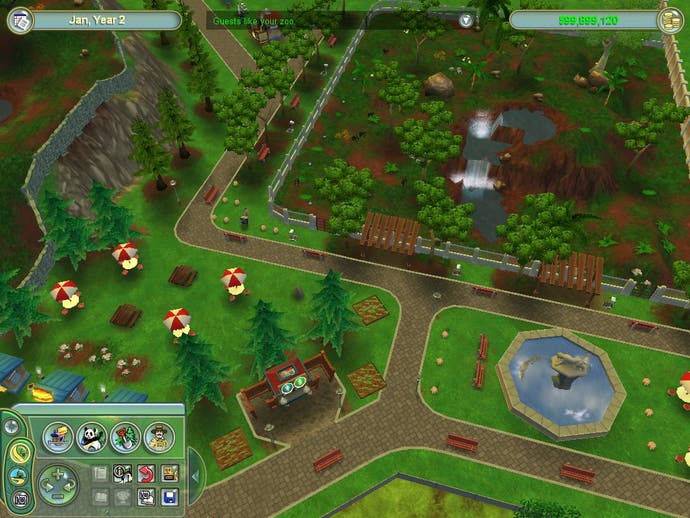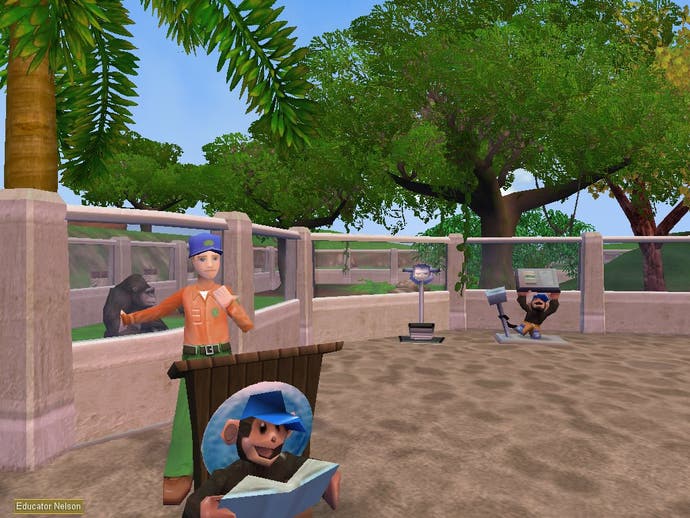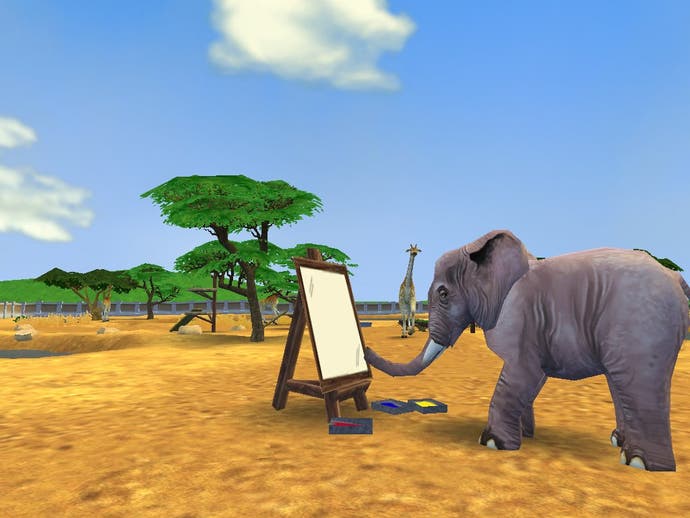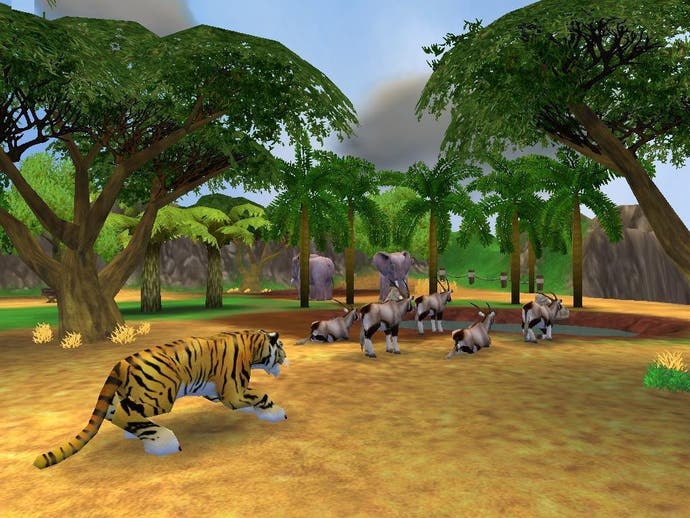Zoo Tycoon 2
"Mommy! What's that monkey doing?" "Move along, dear."

It was about this time when a concept solidified in my mind which I've never quite shook.
I was at a major British Zoo - at the time, one of the more dismal places I'd visited in my life - on a University field trip. I walk into the Monkey house, chatting to my friend. As the doors open and we step into the darkened hall, we're met by the sight of two monkeys happily going at it. The male looks up at us and gives us a perfect "Would you mind?", chastising us for our rude intrusion. Laughing, we follow the cage around to the right, until we're confronted with... it.
Three monkeys. One sits, boredly chewing some manner of shoot. While he does this, a monkey sitting along the branch to him has reached over and is in the process of frenetically jerking his shoot-chewing friend off. The bored expression doesn't change one jot. And then, before our eyes, while the monkey-pleasuring continues, shoot-chewing chap slowly curls out some monkey poop which falls to bounce off the head of a third primate on the bar below. Who doesn't react either.
That's not natural.
There's something very wrong about Zoos.
There's nothing wrong about Zoo Tycoon. Or, at least, wrong in that way.
The capitalistic darkness of Theme Park has gradually been bleached from the genre, which was quite open about success being related to your fleecing the customer for every last penny. Compare the emotional tone of Bullfrog's game to the (patched) Rollercoaster Tycoon 3. From unfair to all the fun of the fair...

And... well... Zoo Tycoon 2's cheery upbeat nature makes Rollercoaster Tycoon look like Manhunt.
Like its predecessor, it follows the Tycoon formula exactly. You're placed in charge of [X]. By purchasing [Y], toilets and food-shops you must keep your customers happy. If they're happy, you'll become more popular, attract more customers and so get more money, which you can spend on making your [X] even better by purchasing even more [Y].
Here, [X] is Zoo. [Y] is animals.
The link which turns Zoo Tycoon so cute is that the main source of money is from donations from individuals. While it's relatively cheap to get into the zoo, almost everyone can be convinced into inserting some cash into a collection box if they see something which amuses or educates them. That is, if animals are happy. So if the animals are happy, the people are happy. If the people are happy, they give you all their money. So the way to success is to just make animals happy as possible, which means spending as much money on their enclosures that you can afford. This means that it's hardly the deepest management game in the world, since your routes to success are so constrained.
This is stressed by the crowds being the most lily-livered group of videogame AIs you'll ever see. For example, a group of kids after seeing a crocodile chase a flamingo around its compound actually considered it as a bad thing. This is AI clearly written by someone who's never actually met a real child.
(I'm not being entirely facetious here either. The ability to choose morally wrong but fiscally rewarding processes, at the suitable risk, expands the strategic depth in any game. The classic would be Elite's choice of whether to transport narcotics or not - they make you large profits, but cause the ire of the police department. Crowd pleasing actions which are bad for the animals, but possibly gaining the censure of governing bodies would be the equivalent here.)
Still - shallow it may be, but it's impossible to deny that it has a subtle and warming appeal. You think there's nothing to it, but it's managed to keep me up to the early morning as much as any of the big name games that have dominated my life in these winter months.

It has three main routes of play. First, a sandbox mode where with infinite money you can make whatever manner of park you can imagine. This would include, for me, giant arenas full of lions, antelopes and lions eating antelopes. Then there's the challenge mode, where you create and expand a single zoo, being offered assorted (as the title suggests) challenges, the success of which contributes to the fame of your zoo. Finally, the campaign mode, where you're offered pre-designed scenarios with set achievable victory limits - "heal all the animals in this abused zoo" or similar.
The simplicity of the game is where it falls apart. The challenges' solutions are mostly either strikingly obvious or more to do with manipulation of the game's systems than any real strategy. For example, building a series of enclosures against a time limit could be tricky... if you weren't able to pause the game and do all your buildings in an eternal extended moment. It's hardest when the solution is buried in the game mechanics - for example, a mission where you have to have one create one enclosure for each of the Earth's biomes ("Desert" "Scrub" "The Blancmange plains of James Pond: Robocod") can only be completed when you have unlocked an animal from each of the places - and Alpine animals unlock last. To complete it, you essentially ignore the mission and make a profitable enough zoo to unlock the mountain-hopping beast, and then quickly fix your zoo to meet the mission objectives.
Maybe we're beginning to lose track of the earlier stated point: That this is still actually fun and oddly compelling. The reason why, however, is a little more elusive. I've been doing something I don't normally do when writing a review. Reading other people's reviews. A quick scan down Metacritic reveals the usual standard-deviation of marks, mostly weighted positive... but that's not what I was really looking for. What's actually interesting - especially bemusing in the more positive reviews - is the complete lack of any explanation of why it's fun. It's kind of taken as a given, which is always worrying. And while burying actual reasons for something's charm beneath blank compliments like "fun gameplay" is hardly an unusual thing in games journalism, this generalised shrug is worthy of note.
Here's my take.
Its appeal is in how it doesn't offend; its over-sweet saccharine taste. It's a game which serves the same purpose in life as pink scented hello-kitty notepaper does in a certain style of teenage girl. Its cuteness is its point.
Take the 3D graphics which while far from impressive compared to Rollercoaster Tycoon 3, let alone the cutting edge of FPS science, add much needed character to the various denizens of the zoo. The animals themselves caper around, courting, chasing, playing with toys, sleeping, eating and generally acting in far more entertaining manners than their terribly reticent real world inspirations. Treat them well, and they reproduce, leading to impossibly sweet youngsters. It hits the nurturing gene in the mind directly and well.

This is emphasised by the first-person mode, which rather than being a purely decorative addition like in other 3D games, allows you to take the role of a zookeeper running around the enclosure. Tap space and you can do the refilling water, grooming and other zookeeperly tasks, which as well as saving you having to pay a real keeper early in the game where cash is tight, it also helps cement an emotional connection with your charges. The fact it turns the game into the world's first first-person pooper-scoop-'em-up is just an added bonus.
Perhaps most importantly, when its strategy is barely as substantial as the candy floss the sellers charge to your giggling customers, it understands it's insubstantial. Rather than just being shallow because they haven't tried, they're shallow because they have tried. Sure, it'll make it a better management game if you had to calculate if you could afford to modify the landscape and add water features and such... but that wouldn't encourage you just play around the tools to see if you can create something pretty. While most Tycoon games constrain the "Create something pretty" to the Sandbox modes, Zoo Tycoon lets it permeate the rest of the game, and so elevating it above what a classical games-theory analysis of its charms would predict.
There are some surprising omissions. The main one being the complete lack of any ability to speed up time - especially since that once a park has stabilised there can be a lot of waiting around while you amass enough cash to buy a Gorilla or whatever. Any game which I felt comfortable enough to allow to leave running while I went and made a tasty round of cheese on toast clearly lacks some urgency issues. There's some oddities in the pathfinding of both staff and animals, with warning messages popping up of Zookeepers being incapable of reaching a food dish or similar far too regularly. Well, wait a second and the animal will get out of the way, you dolt. And a handful of outright bugs, such as a few moments when animals have lost all interest in their food-dish, then complain about starving. Picking them up and replacing them, however, seems to reset their thinking. The same goes for toys you've left in their cells and they've apparently forgotten about.
I mention the bugs just for completeness' sake, however. They didn't significantly detract from the soft, yet undeniable, pleasure I felt when crafting then perusing my own zoo. While the hard-edged Zoo Tycoon seems as inappropriate title as ever, this Zoo Philanthropist's journey will be recalled fondly.
It'd be better with onanistic defecating chimps though. Wouldn't everything?

